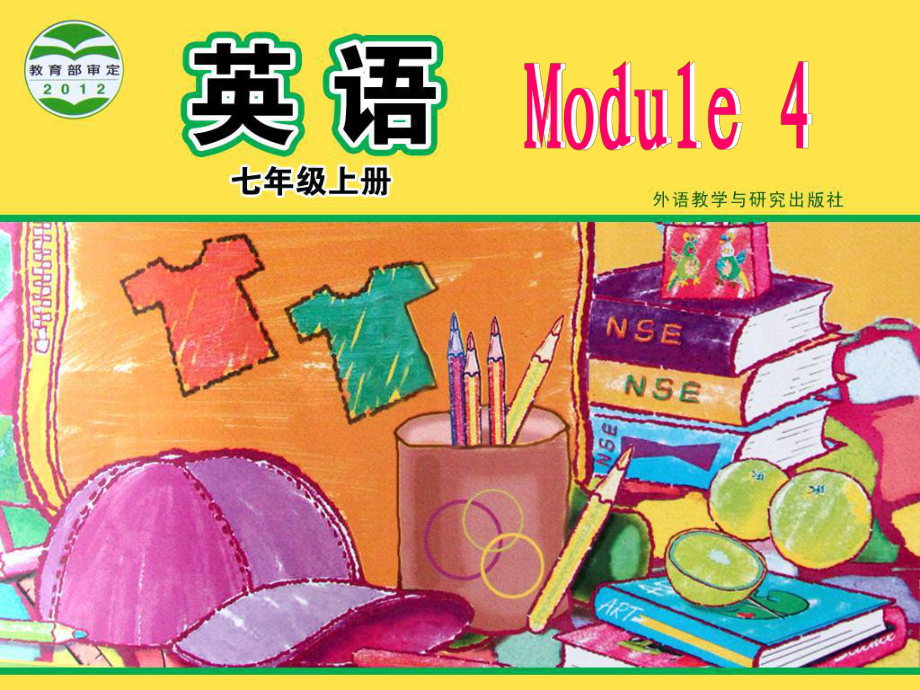《外研版初中英語(yǔ)七年級(jí)上冊(cè)Module 4 Unit 1 We39;ve got lots of apples課件》由會(huì)員分享,可在線閱讀�,更多相關(guān)《外研版初中英語(yǔ)七年級(jí)上冊(cè)Module 4 Unit 1 We39;ve got lots of apples課件(42頁(yè)珍藏版)》請(qǐng)?jiān)谘b配圖網(wǎng)上搜索。
1����、/ /U:/ / / / / / candies/i:/i/i/ /i/i:/ /i:/ / beanscarrots/ /:/ / / /e/ potatoestomatoes/e/ / / /U:/ milk/ coffee/ / /i:/ / / /U:/ /:/ / / apple orangechocolate chicken beef tomato potato carrot beanswater teajuicecoffeecolamilkLabel the food in the pictures with the words from the box.candy fruit
2��、meat vegetablesmeat candyvegetablesfruit drink Ask and answer.A: I have got a/some .?Have you got a/any ?B: Yes, I/we have. / No, I/we havent. I have got a/someapple beans beef carrot chicken chocolate coffee cola juice milk orange potato tea tomato waterapples juicebeans milkbeef orangescarrots pot
3�、atoeschicken tea coffee tomatoescola waterListen and check ()the food and drink Betty and her mother have got.(Activity2) 1. Tonys family have got some meat.( )2. They have got some chocolate.( )3. They have got lots of apples. ( )4. They have got some oranges. ( )5. Tonys mother has got some coffee
4、.( )6. Tony has got some cola.( )FTTFFFhasnt got anyhavent got anyhasnt got anyhasnt got anyRead and complete the table.Read and complete the table.Things Tonys family has got at homeThings Tonys family hasnt got at homeFoodDrinkorange juice, coffee, cola, teachicken, orangesapples, chocolateTonys f
5�����、amily has got some at home�����, but they havent got any at home.1. some和和any的用法的用法1)some和和any 既可以修飾可數(shù)名詞又可以既可以修飾可數(shù)名詞又可以修飾不可數(shù)名詞修飾不可數(shù)名詞, some常用在肯定句中常用在肯定句中, 而而any則常用在否定和疑問(wèn)句中�����。所以則常用在否定和疑問(wèn)句中���。所以, some 和和 any 的區(qū)別在于的區(qū)別在于: some和和any 的的用法主要是考慮用在肯定句���、疑問(wèn)句還用法主要是考慮用在肯定句��、疑問(wèn)句還是否定句中是否定句中, 與名詞的可數(shù)與否無(wú)關(guān)與名詞的可數(shù)與否無(wú)關(guān)����。2) some的用法的用
6���、法: some意為意為“一些一些”�����,可����,可作形容詞和代詞���。它常修飾可數(shù)名詞作形容詞和代詞�。它常修飾可數(shù)名詞復(fù)數(shù)����。復(fù)數(shù)。如:如: some books 一些書(shū)����,一些書(shū)�,some boys 一些一些男孩��,也可修飾不可數(shù)名詞����,如:男孩����,也可修飾不可數(shù)名詞,如:some water 一些水�����,一些水����,some tea 一些茶一些茶葉,葉��,some 常用在肯定句中����。常用在肯定句中��。3) any的用法的用法: any意為意為“任何一些任何一些”��,它����,它也也 可修飾可數(shù)名詞復(fù)數(shù)或不可數(shù)名詞�,可修飾可數(shù)名詞復(fù)數(shù)或不可數(shù)名詞,常用于疑問(wèn)句和否定句�。常用于疑問(wèn)句和否定句。如:如: I have some tea h
7��、ere. 我這兒有些茶葉�����。我這兒有些茶葉�����。 I cant see any tea. 我沒(méi)看見(jiàn)茶葉����。我沒(méi)看見(jiàn)茶葉。 Do you have any friends at school? 你在學(xué)校有些朋友嗎你在學(xué)校有些朋友嗎? 4) 但在表示建議�,反問(wèn)����,請(qǐng)求的疑問(wèn)句中�����,但在表示建議�����,反問(wèn)����,請(qǐng)求的疑問(wèn)句中����,或期望得到肯定回答時(shí),多用或期望得到肯定回答時(shí)����,多用some而而不用不用any。如:如: Would you like some coffee? 你要不要你要不要來(lái)點(diǎn)咖啡來(lái)點(diǎn)咖啡? How about some fruit juice? 來(lái)點(diǎn)水果來(lái)點(diǎn)水果汁如何汁如何? 5) 當(dāng)當(dāng)any表示表示“任
8�����、何任何”的意義,起強(qiáng)調(diào)作的意義���,起強(qiáng)調(diào)作用時(shí)�,它可以用在肯定句中���;用時(shí)���,它可以用在肯定句中; Any student can answer this question. 任何學(xué)生都可以回答這個(gè)問(wèn)題��。任何學(xué)生都可以回答這個(gè)問(wèn)題����。2. many, much, lots of 的用法:的用法:1) many 許多,用來(lái)修飾可數(shù)名詞�����,許多���,用來(lái)修飾可數(shù)名詞����,例如:例如: Are there many students in his class? 他的班上有很多學(xué)生嗎?他的班上有很多學(xué)生嗎�? I havent got many English books 我沒(méi)有很多英語(yǔ)書(shū)。我沒(méi)有很多英語(yǔ)書(shū)�。2) muc
9、h許多許多 用來(lái)修飾不可數(shù)名詞用來(lái)修飾不可數(shù)名詞�����,如:如: We havent got much work to do 我們沒(méi)有太多工作要做�。我們沒(méi)有太多工作要做。 Is there much milk in the bottle? 瓶子里有很多牛奶嗎����?瓶子里有很多牛奶嗎? 3) lots of = a lot of 許多它既可以修飾可許多它既可以修飾可數(shù)名詞�����,相當(dāng)于數(shù)名詞�,相當(dāng)于many�����;也可以修飾不���;也可以修飾不可數(shù)名詞����,相當(dāng)于可數(shù)名詞,相當(dāng)于much����,例如:例如: There are lots of apples on the desk. 桌子上有很多蘋(píng)果。桌子上有很多蘋(píng)果�����。We hav
10�、e got lots of meat at home. 我們家里有許多肉。我們家里有許多肉���。3. too much 和和 too many 的用法:的用法: too much 和和 too many 都表示都表示“太多太多”����。 1) too much + 不可數(shù)名詞不可數(shù)名詞 �,例如:,例如: We have too much work to do. 我們有太多的工作要做��。我們有太多的工作要做。 2) too many + 可數(shù)名詞��,可數(shù)名詞�����,例如:例如: There are too many students in our class. 我們班上有太多的學(xué)生�����。我們班上有太多的學(xué)生����。重點(diǎn)短語(yǔ)重
11、點(diǎn)短語(yǔ):1. have/has got 擁有擁有2. go shopping 去買(mǎi)東西�;去購(gòu)物去買(mǎi)東西;去購(gòu)物3. lets do sth. 讓我們?nèi)プ瞿呈伦屛覀內(nèi)プ瞿呈?. too much 太多太多5. too many 太多太多6. lots of 許多許多7. be good for 對(duì)對(duì)有益有益8. be bad for 對(duì)對(duì)有害有害9. How about ? 好嗎�����?好嗎��?行嗎��?行嗎��?Retell acording to the table.Retell acording to the table.Things Tonys family has got at homeThings
12�、at homeFoodDrinkorange juice, coffee, cola, teachicken, orangesapples, chocolateTonys family has got some _, _ at home.Tonys family hasnt got hasnt got any_, _, _, _, _, _, _ at home.apples chocolatechicken orangesOrange juice coffee, cola, tea1. Lets go shopping for food and _ (飲料飲料).2. We havent g
13、ot any _ (肉肉).3. Lets get some _ (雞肉雞肉).4. Have you got _ (一些一些) chocolate?5. What _ (種類種類) of fruit do you like best?6. Lets get some _ (咖啡咖啡) for mum.drinkmeatchickenanykindcoffee7. How about some apple _ (果汁果汁)?8. There are lots of _ (西紅柿西紅柿) in the basket.B. 按要求改寫(xiě)句子:按要求改寫(xiě)句子:1. There is some fish
14��、 on the plate. (改為否定句)(改為否定句)2. We have got some oranges. (改為一般疑問(wèn)句)(改為一般疑問(wèn)句)There isnt any fish on the plate. There isnt any fish on the plate. Have you got any oranges? Have you got any oranges? tomatoesjuice3. They have got some milk and water. (改為否定句)(改為否定句) 4. There is a tomato on the table. (改為
15��、復(fù)數(shù)形式)(改為復(fù)數(shù)形式)5. He has got a potato.(改為復(fù)數(shù)形式)(改為復(fù)數(shù)形式)They havent got any milk and water. They havent got any milk and water. There are some tomatoes on the table.There are some tomatoes on the table.They have got some potatoes.They have got some potatoes.3. 買(mǎi)些土豆怎樣���?買(mǎi)些土豆怎樣�? _ buying some _?4. 我們沒(méi)有水果了�,讓
16、我們?nèi)ベI(mǎi)些吧��。我們沒(méi)有水果了�����,讓我們?nèi)ベI(mǎi)些吧�。 We _ fruit, lets _.5. 他爸爸有許多好朋友。他爸爸有許多好朋友����。 His father _ good friends.has got lots of / manyhavent got any get some How about potatoes 每課必背:每課必背:1. 擁有擁有2. 去買(mǎi)東西;去購(gòu)物去買(mǎi)東西�;去購(gòu)物3. 讓我們?nèi)プ瞿呈伦屛覀內(nèi)プ瞿呈?. 太多太多6. 許多許多7. 對(duì)對(duì)有益有益8. 對(duì)對(duì)有害有害9. 好嗎?好嗎?10. 我們有許多蘋(píng)果�。我們有許多蘋(píng)果。1. have/has got 2. go shopping 3. lets do sth. 4. too much6. lots of 7. be good for 8. be bad for9. How about ?10.We have got lots of apples.
 外研版初中英語(yǔ)七年級(jí)上冊(cè)Module 4 Unit 1 We39;ve got lots of apples課件
外研版初中英語(yǔ)七年級(jí)上冊(cè)Module 4 Unit 1 We39;ve got lots of apples課件

